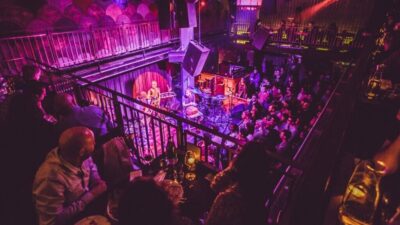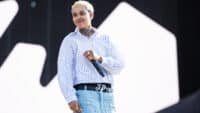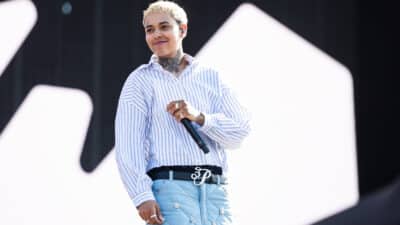Music
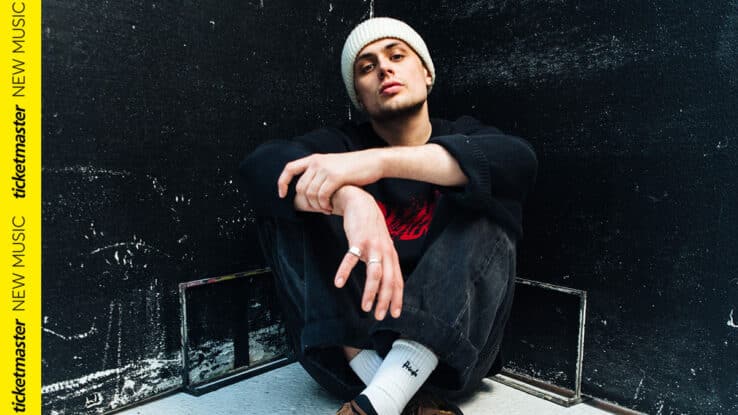
Interview
corto.alto: “Jazz is more of a language than a genre”
Get to know this week's Ticketmaster New Music act – of the most exciting jazz acts in years
If the name corto.alto is new to you, then perhaps a brief history. Having finished the Royal Conservatoire of Scotland as a trombonist and the youngest ever graduate of their jazz programme, Liam Shortall rented a cheap flat above a bar on Sauchiehall Street, Glasgow’s party strip. Here he and a rotating cast of friends rehearsed and recorded each other’s projects. Shortall started a Facebook page under the name corto.alto, where he began releasing music prolifically. Indie labels came calling.
Fast forward to last year, when Shortall released his debut album Bad With Names, a dynamic “future jazz” album, as he calls it, that glides from graceful ambience to wobbly donks and bops. It earnt him a Mercury Prize nomination this year, and one of the most in-demand new jazz acts of 2024. Earlier this year he also released 30/108, the culmination of picking 30 out of the 108 demos he had saved, finishing them, and releasing them every midnight for 30 consecutive days.
As he sets off on a UK tour next month, we catch up with this week’s Ticketmaster New Music act on his journey so far.
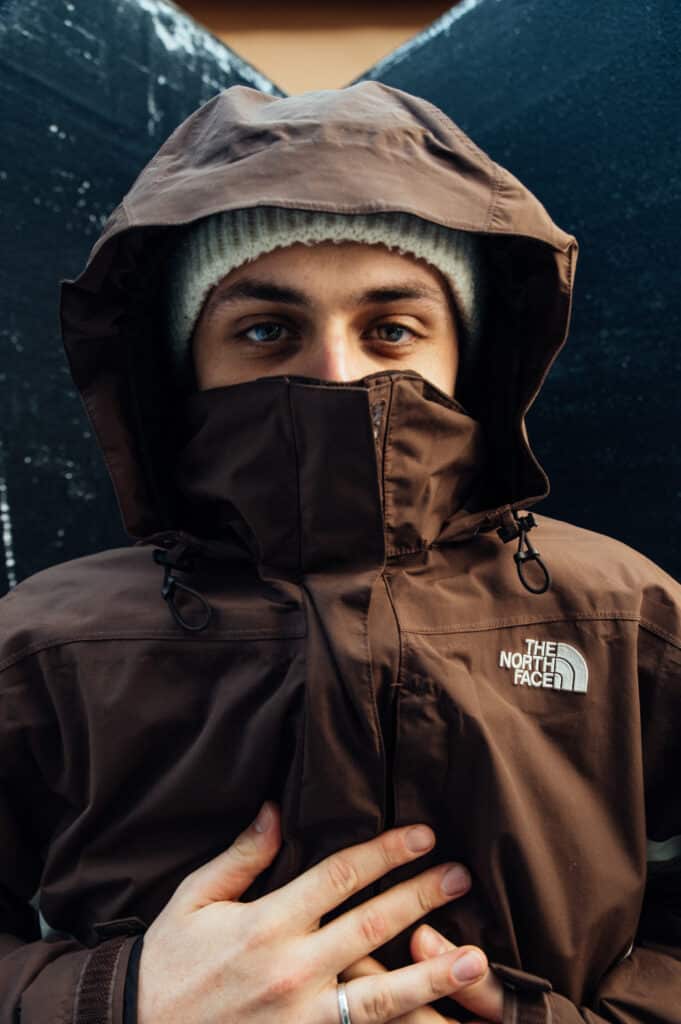
For a good five years or so now, it feels like jazz has been edging closer and closer into the pop culture mainstream, but it can still be a bit of a huge or daunting world for some. You call your jazz future jazz, tell me a little bit about how you’ve carved your niche or sound in this sphere?
I love jazz music, you know, I grew up listening to jazz music, but I also grew up listening to a lot of 90s hip-hop, a lot of James Brown, a lot of funk and soul, a lot of Motown, a lot of classical music. For me to be an authentic artist, for anyone to be authentic, you’re basically just outputting what music you’ve absorbed throughout your youth and throughout what you’ve listened to. I think jazz is definitely a big part of that for me, but it’s not the only part, in any way. I suppose it’s kind of difficult, and I’m kind of the worst person to ask that, because to me it’s just music. I just love making music and I suppose what comes out is is quite jazzy, because me and a lot of people I play with are jazz musicians and we grew up playing in big bands, grew up doing swing or bebop gigs.
But yeah, I think future jazz, to me, is just taking the the elements of jazz, because to me it’s more of a language than a genre, it’s taking elements of how you approach making music, with improvisation, with the structures of the songs, with the harmonic ideas and all this stuff. But then also adding in sound design, sampling, all these kind of things that are more modern, production tools that you wouldn’t really commonly hear in jazz. I think jazz musicians are guilty of kind of looking at electronic music, for example, or pop music where there’s hyper production, or there’s a lot of sound design, synths and electronics going on and thinking that’s not as valid as, as, like, pure jazz, but I just think that’s a load of sh*t. I’ve always respected electronic music and people that make electronic music, even dubstep producers I’ve always respected as much as they respected people that can improvise, and they’ve taken it as seriously.
Everybody knows about the London, or South London jazz scene. Tell me about Glasgow’s?
This is always quite a difficult question, because I don’t think Glasgow has a sound in the same way like South London has a real specific sound. And I think that’s because to me, the Glasgow thing is just the community, the cross pollination, everyone in each other’s bands, everyone playing together, everyone knows each other. For example, Fergus McCready, who’s the piano player on my album. He’s got his own albums, and he’s massively successful in that world, and he but he has a piano trio andmakes Scottish jazz, which is very influenced by Scottish folk music. His album got nominated for the Mercury Prize two years ago, but he plays my band and I play with him, and his music is just wildly different to mine, but we both have different elements of what it is to make music in Scotland. And I think in Scotland, because we don’t have these kind of, I don’t want to say incentive structures, but like in a place like London, where you have big labels, radios, promoters that have a really specific thing they want to sell, then you’re I think as an artist, it’s easier to write music for them playlists, or for them radio stations, or for them labels to make them happy. But I think in Glasgow, there’s no infrastructure around jazz apart from the main jazz festivals, which we aren’t really involved with. There’s not a jazz specific label, or a jazz specific radio show or or even a jazz press, we don’t have a magazine or blog or anything like that. Obviously a lot of that is negative, because we don’t have that kind of structure to help boost the thing. But I’ve found that very freeing in terms of, I’ll just make music, and I’m not making music for a specific thing, or it’s for a fest, for a specific festival that I really want to get on the lineup. I feel like being out of that feels quite refreshing. That’s what I’ve come to when I’ve been thinking about what it means to make jazz music in Scotland, because you can just see that by the kind of diversity of music that people make that are doing well, the sound of everyone’s stuff is really not uniform.
I’ve spoken to other musicians and actors from Glasgow and often one of its simplest but most important virtues for creativity is just how cheap the rent is…
That’s such an important point: just the economic aspect of being in a place where it’s cheaper, where it’s smaller, where you can go to a gig, and it’s not an hour trip there and back or whatever. Everywhere is 20 minutes away and I think that encourages less division. Obviously, London is amazing, I work there all the time. But I think it’s nice being in Glasgow, because it’s just one massive hub, and it’s just a perfect size. As you say, it’s cheap, so even musicians aren’t doing four function gigs a week to do it, they’ve maybe only got to do one a week to just get by, and then the rest of the time they can do creative stuff.
At the time we’re speaking it’s almost a year to the day since the release of Bad With Names, and what a year it’s been. What have been some of the biggest pinch me moments?
Yeah it’s been an absolute mental year. I’m completely obsessed with making music, if I’m bored, it’s what I’ll do. You know, it’s not like, “Oh, I’ve got to work on my album today.” It’s always ticking along, and it’s been like that for the last five or six years. So to me, it’s been a crazy year, but the progress has been very, very incremental. You know, this year we’ve done a lot, we’ve done almost 70 gigs, we’ve been just able to go to places we’ve never been before, touring in Denmark, Germany, Poland, loads of gigs in Italy. That’s been really nice, that’s probably been the biggest thing, where you go to places and people are singing along to instrumental tunes, and you’re like, I don’t even speak the same language as these people! That kind of universal nature of instrumental music is something that I just love ,when you can go to anywhere and people know your tunes and there’s no kind of language barrier between between the music. And I think that’s the real power of instrumental music.
But obviously the Mercury Prize is something I was never, ever expecting to get on, especially in a year where there was so many great albums. I’d not really even considered that it would be possible. I mean, my label submitted it, and it cost money to submit it, and I was a bit, like, “that’s a bit of a waste of money.” So when I got the call for that, that was obviously just like a dream come true. I think anyone that makes music in the UK, and, you know, I’ve done it for a while, that’s always like a hype dream that, well, maybe my fifth album will get nominated for that, or something. So to get it for the debut album was crazy. I suppose the gig highlights for me this year have been when we closed We Out Here festival on the main stage in front of, I don’t know how many thousands of people, but that was terrifying and fun.
I think making that 30 track album was really rewarding experience for me. I think after a debut album where it’s 12 tracks and it’s super refined and super polished. It took me two and a half years to make that and I was stressing about every beat and every sound and every mix decision, everything was really thought over. And then that 30 track album was just like, I don’t have time to think about any of this stuff. It was super liberating. It was just like, that’s fine, that’s fine, that’s fine. I had a month to go and I’d exported two tracks, and I had to finish 30 of them. I was doing 18 hour days of just working on the music for a whole month, but really had a great flow and that showed me not to stress about music decisions. Often, the instinctual nature of making music is the place where you should go and just trust in yourself. I think that has been the funnest personal thing for me this year.
I read in an interview before you played Montreux Jazz Festival that you felt imposter syndrome going into prestigious events like that. Did playing it help with that, and is that a personal thing or reflective of younger jazz musicians, do you think?
Making this kind of music, which is obviously jazz influenced, you don’t really feel like a real jazz musician, because it is a bit shunned. I don’t really care, haha! You know, being at the festival there’s these really famous American jazz musicians. Amazing acts, but being somewhere like that, you do feel like you’re kind of in disguise a little bit. You’re like, yeah, we’re jazz musicians too! But yeah, it gets it gets easier. Last year we were playing as a seven piece, and we wanted to tour loads in Europe this year, and it was just impossible financially to do that with seven people. So we’ve been doing it mostly with three or four, which is, mean, I’ve had to play bass and do lots of looping and sampling. It’s a very electronic setup, and I always wanted to do that, but I was always terrified of doing it, because as a trombone player, you literally just go, “I need this trombone, and that’s the only thing I need not to break.” From going to that to go into a setup where you’ve got four instruments and probably about 50 different cables that can break at any time, you’ve got a laptop, all these things because you’ve got click tracks that are all like programmed and all these things that could break. That was always a bit stressful. This year has been really nice getting comfortable with that setup, and I suppose the imposter syndrome goes once you are more confident with the music and stuff like that. But at Montreaux I was definitely scared. I think Monteaux and North Sea Jazz Festival, growing up as a jazz musician, those are the two where you’re like, I’d love to be able to do that.
Going into a headline tour now, do you take a different kind of confidence going into it knowing its your people, in a way you might not at some of these events we’ve just discussed?
The thing I love about my audiences, I suppose it’s weird to say, but it’s nice to look at when it’s super diverse. It’s people from all genders, all ages, all backgrounds. I feel like jazz crowds can often be quite just like men my age. But that’s what I really enjoyed recently, speaking to people after the show as well. There’s people that are in their 70s and people that are 18, that are just getting into that kind of music, and it’s Yeah. I think that that’s really important, isn’t it? I think that it’s quite daunting as well, in a different kind of way, because they’re expecting things and they’ve seen it before. Maybe it’s harder to hide mistakes, but that’s part of it, you know, part of any kind of live performance, being prepared to hide things that go wrong.





